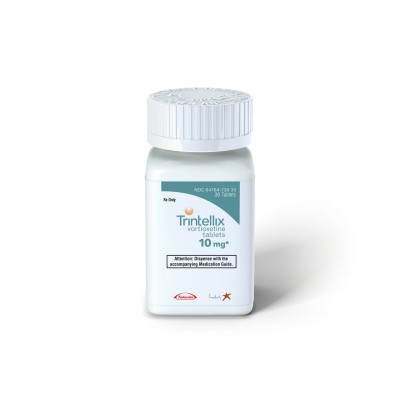Metabolized Form of B Vitamin Improves Depression in People with MTHFR Deficiency
MTHFR is an enzyme needed for the body to break down vitamin B9, also known as folate or folic acid. It also helps convert the toxic amino acid homocysteine into the antidepressant amino acid s-adenysl-methionine. However, a significant segment of the population (some estimate 40%) have a genetic mutation in the MTHFR gene that interferes with the body’s ability to break down B vitamins and is linked to higher levels of homocysteine. MTHFR mutations are also linked to depression.
A 2016 study by Arnold W. Mech and Andrew Farah in the Journal of Clinical Psychiatry found that treating people with major depression and a MTHFR deficiency using a combination of micronutrients and already-broken-down B vitamins improved their depression and reduced their homocysteine levels compared to placebo.
The study included 330 adult patients with major depression and one of two genetic variants in the MTHFR gene—C677T or A1298C. Of those who received the metabolized vitamins, 82.4% showed reduced homocysteine levels. Those who received placebo showed a small average increase in homocysteine. The vitamin group also saw a large drop in depression symptoms on average after 8 weeks, with 42% achieving full remission. There were no side effects.
These findings suggest that homocysteine levels play a role in depression and that metabolized B vitamins can be an effective treatment for depression, particularly in those with a MTHFR deficiency. A metabolized form of folate that is commercially available is called L-methylfolate.
Mouse Study Shows That Ketamine Metabolite May Treat Depression with Fewer Side Effects
The drug ketamine has been used intravenously for years to rapidly treat depression, because it can take effect within hours. Unfortunately, its antidepressant effects fade in 3–5 days, and it has some unpleasant side effects. In larger doses ketamine is used as an anesthetic and sometimes as a club drug, for its ability to induce hallucinations and dissociation. It can be addictive as well.
A 2016 animal study by Todd Gould and colleagues published in the journal Nature identified a byproduct of ketamine that may be able to provide the drug’s benefits without its side effects.
When the body breaks down ketamine, it produces several chemicals that are known as ketamine metabolites. The researchers found that one of these, called hydroxynorketamine, reversed a depression-like state in mice, without producing the side effects that would be expected of ketamine.
Gould and colleagues also determined that blocking the transformation of ketamine into hydroxynorketamine prevented ketamine’s antidepressant effects.
Ketamine’s unpleasant anesthetic and dissociative effects result from the blockade of a particular receptor for the neurotransmitter glutamate (the NMDA glutamate receptor). Researchers originally thought that the NMDA blockade was linked to ketamine’s antidepressant effects, but this appears not to be the case. Instead, hydroxynorketamine seems to activate a different type of glutamate receptor, the AMPA receptor.
Gould and colleagues plan to test hydroxynorketamine in humans soon. Because it has already been present in the human body following ketamine administration, they expect it to be safe.
IV Ketamine 2 or 3 Times Per Week Improves Depression
We have written many times before about intravenous ketamine as a fast-acting antidepressant treatment that can produce results within hours. Unfortunately, these quick results tend to fade within a few days. Current research is focused on possible ways of extending ketamine’s antidepressant effects.
A 2016 article by Jaskaran B. Singh and colleagues in the American Journal of Psychiatry reported that giving depressed patients infusions of ketamine (0.5mg/kg of body weight) twice or three times per week improved their depression compared to placebo over a period of up to 2 weeks.
Side effects included headache, anxiety, dissociation, nausea, and dizziness. The dissociation was temporary and improved with repeated dosing.
In Rats, Mother’s Exercise Habits Affect Those of Offspring
 A recent study suggests that when a mother rat exercises during pregnancy, her offspring will exercise more too.
A recent study suggests that when a mother rat exercises during pregnancy, her offspring will exercise more too.
In the study, published by Jesse D. Eclarinel and colleagues in The FASEB Journal, pregnant mother rats were placed in cages that each contained an exercise wheel. One group had access to a working wheel on which they could run. The other group had the same wheel, but it was locked so that they couldn’t use it for running. Daughters of the rats who ran during pregnancy ran more in adulthood (both at 60 days and 300 days after birth) than daughters of the rats who couldn’t run during pregnancy.
While it is a mystery why this occurs, it is consistent with other data about the ways that a parent’s experiences can influence the next generation, even when the offspring don’t grow up with the parents.
For example, father rats conditioned to associate a specific smell with fear of an electric shock have offspring that also fear that smell (but not other smells).
Drug use is another example. Father rats given access to cocaine have offspring that are less interested in cocaine. Interestingly, father rats exposed to marijuana have offspring that are more interested in opiates.
Experiences with drugs or stress are thought to affect the next generation via ‘epigenetic’ marks on ova or sperm. These marks change the way DNA is packaged, with long-lasting effects on behavior and chemistry. Most marks from a mother’s or father’s experiences are erased at the time of conception, but some persist and affect the next generation.
The nature versus nurture debate is getting more and more complicated. Parents can influence offspring in a number of ways: 1) genetics; 2) epigenetics in the absence of contact between parent and offspring after birth; 3) epigenetic effects of behavioral contact—that is, parents’ caring and warmth versus abuse and neglect can affect offspring’s DNA expression too. All these are in addition to any purely behavioral influence a parent may have on their offspring via discipline, teaching, being a role model, etc.
Editor’s Note: The moral of the story is, choose your parents wisely, or behave wisely if you yourself become a parent.
TDCS Can Change Sleep Duration
A German study published in 2016 suggests that transcranial direct current stimulation (tDCS) can affect the duration of a person’s nightly sleep. Lukas Frase and colleagues compared the effects of two different tDCS parameters and a sham stimulation on the sleep patterns of 19 healthy volunteers.
TDCS is a treatment in which an anode and a cathode electrode placed on the skull are used to apply a steady, low-level current of electricity to the brain.
Bi-frontal anodal stimulation, intended to increase arousal, significantly decreased total sleep time compared to the other two interventions.
Bi-frontal cathodal stimulation, intended to decrease arousal, did not increase total sleep time, possibly because there is a ‘ceiling’ beyond which good sleepers do not sleep longer.
EEG analysis showed that the anodal stimulation did increase arousal, while cathodal stimulation decreased it.
The research increases what is currently known about sleep-wake regulation by showing that total sleep time can be decreased using anodal tDCS. The researchers hope this knowledge can contribute to future treatments for disturbed arousal and sleep.
Antidepressant Brintellix Renamed Trintellix
You may notice the label on your prescription bottle changing. As of June, the antidepressant vortioxetine (formerly Brintellix) is now called Trintellix. The US Food and Drug Administration approved the change to reduce any possible confusion of the antidepressant with a blood-thinning medication called Brilinta.
Weight Gain is a Common Issue with Antidepressants, But Buproprion is an Exception
A 2016 study by researcher David Arterburn and colleagues in the Journal of Clinical Medicine suggests that taking an antidepressant for two years is associated with an increase in body weight. Luckily, bupropion (trade name Wellbutrin) is an exception that may be a good choice for obese or overweight patients.
The researchers analyzed links between which antidepressants patients in a large health system in Washington State were prescribed and their body weight two years later.
The researchers used fluoxetine (Prozac) as a reference. Most antidepressants did not differ significantly from fluoxetine in terms of the weight gain experienced by people taking the drug.
There were a few exceptions. Compared to non-smoking fluoxetine users, who gained an average of 4.6 pounds in two years, non-smoking bupropion users actually lost weight—an average of 2.4 pounds. (Smokers taking bupropion still gained an average of 6.9 pounds.)
Sertraline (Zoloft) was another exception. Sertraline users gained more than users of other antidepressants—an average of 10.5 pounds over two years.







